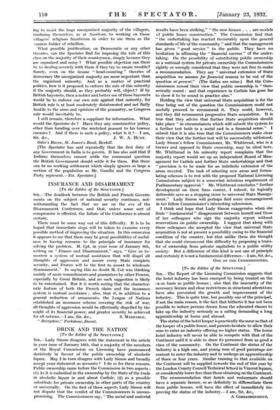DRINK AND THE NATION
[To the Editor of the SPECTATOR.] SIR,--Lady Simon disagrees with the statement in the article in your issue of January 16th, that a majority of the members of the Royal Commission on Licensing have pronounced decisively in favour of the public ownership of alcoholic liquor. May I in turn disagree with Lady Simon and broadly accept your statement as accurate ? I do so for these reasons. Public ownership came before the Commission in two aspects : (1) As it is embodied in the ownership by the State of the trade in alcoholic liquor in and about Carlisle, (2) as a possible substitute for private ownership in other parts of the country or universally. On the first of these aspects Lady Simon will not dispute that the verdict of the Commissioners is uncom- promising. The Commissioners say, " The social and material results have been striking," "the new houses . . . are models of public house construction." The Commission find that " the undertaking has reacted favourably upon the general standards of life of the community " and that the management has given " good service " to the public. They have no hesitation in affirming the " financial success " of the under- taking. On the possibility of substituting public ownership as a national system for private ownership the Commissioners rightly or wrongly considered that they were not free to make a recommendation. They say " universal extension of State acquisition we assume for financial reasons to be out of the question at present." (The italics are mine.) But the Com- missioners record their view that public ownership is " theo- retically sound : and that experience in Carlisle has gone far
to show it to be sound in practice also." -
Holding the view that universal State acquisition is for the time being out of the question the Commissioners could not usefully proceed to recommend it. They could, however, and they did recommend progressive State acquisition. It is true that they advise that further State acquisition should take place " in circumstances which will submit the system to a further test both in a social and in a financial sense." I submit that it is also true that the Commissioners make clear their view that the further test will be successfully withstood. Lady Simon's fellow Commissioner, Mr. Whitbread, who is a brewer and opposed to State ownership, may be cited here. Mr. Whitbread in his minority report complains that the majority report would set up an independent Board of Man- agement for Carlisle and further State undertakings and that " provision is to be made for an indefinite extension of the areas covered. The task of selecting new areas and formu- lating schemes is to rest with the proposed National Licensing Commissions subject to a somewhat nebulous requirement of Parliamentary approval." Mr. Whitbread concludes " further development on these lines cannot, I submit, be logically defensible save as a stepping stone to universal State Manage- ment." Lady Simon will perhaps find some encouragement in her fellow Commissioner's interesting submission.
I think and hope that Lady Simon exaggerates when she finds " fundamental " disagreement between herself and those of her colleagues who sign the majority report without reservations on public ownership. I suggest that along with these colleagues she accepted the view that universal State acquisition is not at present a possibility owing to the financial condition of the country, but that unlike them she thought that she could circumvent this difficulty by proposing a trans- fer of ownership from private capitalists to a public utility society. But a difference of this kind is not one of principle and certainly it is not a fundamental difference.—I am, Sir, &c.,
ONE OF THE COMMISSIONERS.




































 Previous page
Previous page